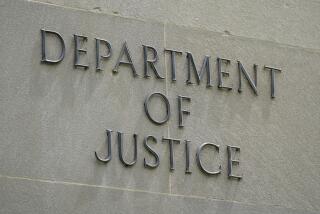When the government kills
- Share via
Whether or not it succeeds in court, a lawsuit challenging the killings of Al Qaeda figure Anwar Awlaki and two other U.S. citizens clearly lays out the problems with the Obama administration’s policy of “targeted killings” of suspected terrorists even outside the battle zone of Afghanistan.
Allowing the president of the United States to act as judge, jury and executioner for suspected terrorists, including U.S. citizens, on the basis of secret evidence is impossible to reconcile with the Constitution’s guarantee that a life will not be taken without due process of law. Under the law, the government must obtain a court order if it seeks to target a U.S. citizen for electronic surveillance, yet there is no comparable judicial review of a decision to kill a citizen. No court is even able to review the general policies for such assassinations. (Awlaki’s family failed in 2010 to persuade a court to enjoin the government from killing him.)
The suit filed this month by the American Civil Liberties Union and the Center for Constitutional Rights seeks an after-the-fact determination that the killings of Awlaki, an associate named Samir Khan and Awlaki’s 16-year-old son, Abdulrahman, were not legal. The elder Awlaki and Khan were killed in a drone strike in Yemen in September; Abdulrahman Awlaki was the apparently unintended victim of a strike two weeks later.
VIDEO: Congress says domestic drones pose potential threats
Although it ended some of the Bush administration’s abuses in the war against Al Qaeda, the Obama administration has jealously guarded what it sees as its executive prerogative when it comes to targeted killings. There is congressional oversight of the program, but Atty. Gen. Eric H. Holder Jr. has rejected any role for the judiciary. In a speech in March, Holder distinguished between “due process” to which Americans targeted for killing are entitled and “judicial process.”
In the same speech, Holder insisted that targeted killings would take place only when there was “an imminent threat of violent attack against the United States” and when capturing the suspect was “not feasible.” But Holder defined “imminently” broadly to include action that would head off “future attacks.”
Ideally, this lawsuit would result in a thorough examination of the legality of targeted killings (without the administration hiding behind the “state secrets” privilege, as it has done in the past). But it’s doubtful whether the plaintiffs will succeed in their effort to collect damages from Secretary of Defense Leon E. Panettaand other officials. Twice in recent years, in lawsuits against former Atty. Gen. John Ashcroft, the Supreme Court has rebuffed attempts to hold officials personally liable for abuses related to the war against terrorism.
But if the United States is going to continue down the troubling road of state-sponsored assassination, Congress should, at the very least, require that a court play some role, as the Foreign Intelligence Surveillance Court does with the electronic surveillance of suspected foreign terrorists. Even minimal judicial oversight might make the president and his advisors think twice about whether an American citizen poses such an “imminent” danger that he must be executed without a trial.
More to Read
A cure for the common opinion
Get thought-provoking perspectives with our weekly newsletter.
You may occasionally receive promotional content from the Los Angeles Times.






